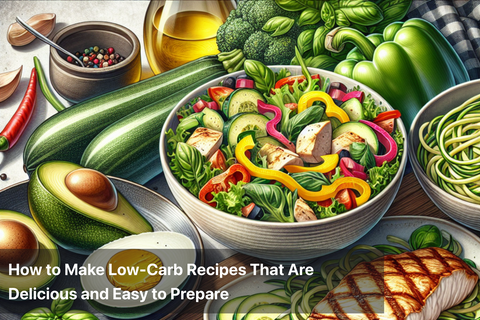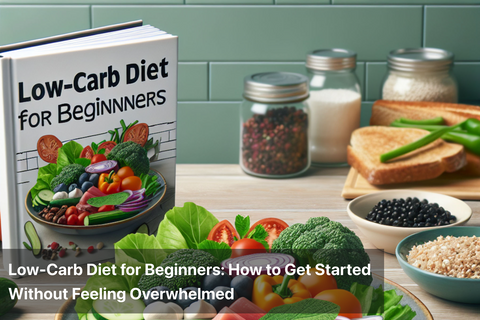
The Top 10 Myths About Low-Carb Diets and Why They’re Wrong
Low-carb diets have gained momentum for their ability to support weight loss, regulate blood sugar, enhance energy levels, and even improve mental clarity. However, many people are held back by persistent myths that misrepresent what a low-carb lifestyle truly involves. These myths are often spread through outdated nutritional beliefs, misinformation online, or misunderstanding of how the body uses fuel.
It’s time to clear up the confusion. Here are the top 10 myths about low-carb diets, why they’re wrong, and the truth behind each claim.

Myth 1: Low-Carb Diets Are Just About Eating Meat and Fat
Why it’s wrong:
Low-carb is often mistaken as a carnivore-style, bacon-heavy diet. While it emphasizes cutting carbohydrates, it doesn’t mean neglecting variety.
Truth:
A healthy low-carb diet includes vegetables, nuts, seeds, dairy, eggs, seafood, and plant-based fats. Even low-carb fruits like berries and avocados are encouraged. It’s about quality and balance—not just fat and meat.
Myth 2: Carbohydrates Are Essential for Energy
Why it’s wrong:
Carbs are a quick fuel source, but not essential. The body has a backup system.
Truth:
When carbs are reduced, the body adapts by using fat for fuel through a process called ketosis. Ketones produced from fat offer stable, long-lasting energy, especially for the brain and muscles. Many people on low-carb diets report higher energy and fewer slumps.
Myth 3: Low-Carb Diets Cause Nutrient Deficiencies
Why it’s wrong:
This comes from the idea that without grains or fruits, you miss key vitamins and minerals.
Truth:
Low-carb diets can be extremely nutrient-dense when they include leafy greens, nuts, seeds, herbs, fatty fish, and dairy. These foods provide magnesium, potassium, B vitamins, calcium, fiber, and antioxidants—often in higher quality and quantity than processed carb-based foods.
Myth 4: You Won’t Get Enough Fiber Without Carbs
Why it’s wrong:
People often associate fiber with bread, cereals, and grains—but fiber doesn’t only come from carbs.
Truth:
Vegetables, seeds, and nuts offer plenty of fiber with minimal net carbs. Foods like chia seeds, flaxseeds, broccoli, avocado, and almonds support digestion and gut health, making fiber deficiencies avoidable on a well-planned low-carb diet.
|
Food |
Total Carbs (per 100g) |
Fiber |
Net Carbs |
|---|---|---|---|
|
Chia seeds |
42g |
34g |
8g |
|
Flaxseeds |
29g |
27g |
2g |
|
Avocados |
9g |
7g |
2g |
|
Broccoli |
7g |
3g |
4g |
|
Spinach |
3.6g |
2.2g |
1.4g |
Myth 5: Low-Carb Diets Are Bad for the Heart
Why it’s wrong:
This myth stems from fear that more fat equals more cholesterol and heart disease.
Truth:
Low-carb diets improve heart health markers like triglycerides, HDL (good cholesterol), and blood pressure. When fat sources are healthy—like olive oil, nuts, fish, and avocado—heart disease risk actually drops. Sugar and refined carbs, not fat, are bigger culprits in heart problems.
Myth 6: You’ll Feel Tired Without Carbs
Why it’s wrong:
Some people do feel low energy initially, but that’s part of adaptation—not a permanent problem.
Truth:
When switching to fat-burning, the body needs time to adjust. Symptoms like fatigue or brain fog typically last a few days (often called “keto flu”). Once adapted, most people feel more energetic, with better mental clarity and stamina.
Common Temporary Symptoms During Transition:
-
Headaches
-
Irritability
-
Low energy
-
Sugar cravings
-
Muscle cramps
Myth 7: You Can’t Exercise on a Low-Carb Diet
Why it’s wrong:
The idea is that carbs are the only fuel for workouts—but that’s not entirely true.
Truth:
Endurance athletes, strength trainers, and everyday fitness enthusiasts can perform well on low-carb diets. Fat-adapted athletes burn fat efficiently and experience fewer energy crashes. Strategic carb intake (like post-workout berries or sweet potato) can also be used without compromising low-carb benefits.
Myth 8: All Carbs Are Bad
Why it’s wrong:
Some people think low-carb equals zero carbs, or that all carbs are harmful.
Truth:
Low-carb eating focuses on reducing refined and high-glycemic carbs like white bread, soda, pastries, and sugary snacks. Nutrient-rich carbs from vegetables, berries, and nuts are still part of a healthy low-carb lifestyle.
Myth 9: Low-Carb Meals Are Bland and Boring
Why it’s wrong:
It’s assumed that without rice, pasta, or bread, food loses its appeal.
Truth:
Low-carb meals are full of flavor, texture, and variety. Herbs, spices, oils, cheese, garlic, mushrooms, roasted veggies, and sauces made from cream, tomato, or tahini create satisfying dishes. With creativity, meals are anything but boring.
Myth 10: Low-Carb Diets Are Unsustainable Long-Term
Why it’s wrong:
People believe low-carb is restrictive or too difficult to stick to.
Truth:
Low-carb becomes easier with time as cravings disappear and energy levels stabilize. It doesn’t have to be extreme—moderate low-carb plans are highly sustainable. When built around whole foods and personal preferences, many people adopt low-carb as a permanent lifestyle.

Why People Often Believe These Myths
|
Cause |
Impact |
|---|---|
|
Outdated dietary guidelines |
Promote high-carb, low-fat eating as standard |
|
Marketing from food industries |
Processed carbs are heavily promoted |
|
Lack of education |
Misunderstanding how fat metabolism works |
|
Media fear-mongering |
Headlines exaggerate risks of low-carb eating |
Summary
Low-carb diets continue to be misunderstood, despite growing evidence of their benefits. Myths such as “you won’t get enough fiber,” “they’re bad for your heart,” or “you’ll feel tired” are often based on outdated science or incomplete information. In reality, a well-balanced low-carb lifestyle offers a wide range of nutrients, improves energy, supports metabolic health, and is enjoyable and sustainable over the long term.
By separating myth from truth, it becomes easier to make smart, empowering food choices. At Lofoods, the mission is to support your health journey with delicious, low-carb products that simplify clean eating and bust outdated diet myths—one meal at a time.
This Blog post is an initiative by Lo! Foods, to provide accurate and Nutritionist / Doctor approved information related to Health. Lo! Foods is India's leading brand for Everyday Functional Foods. Foods designed for specific Health conditions or Needs. Lo! Foods also runs India's largest range of Low Carb Healthy Cloud Kitchens, under the brand names of Lo!, ProteinChef, ATH (All Things Healthy) and DiabeSmart.













Leave a comment
Your email address will not be published.